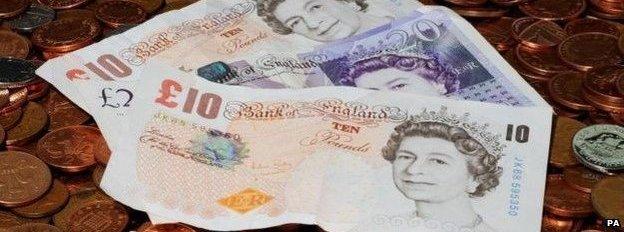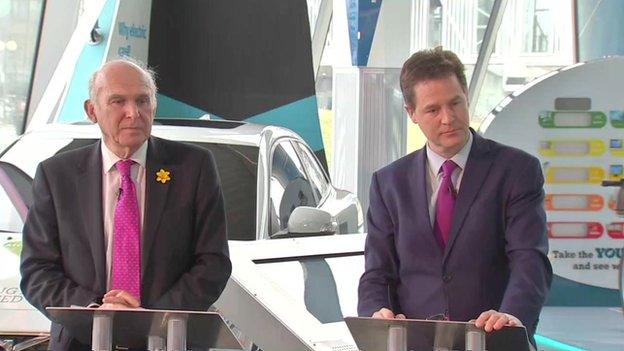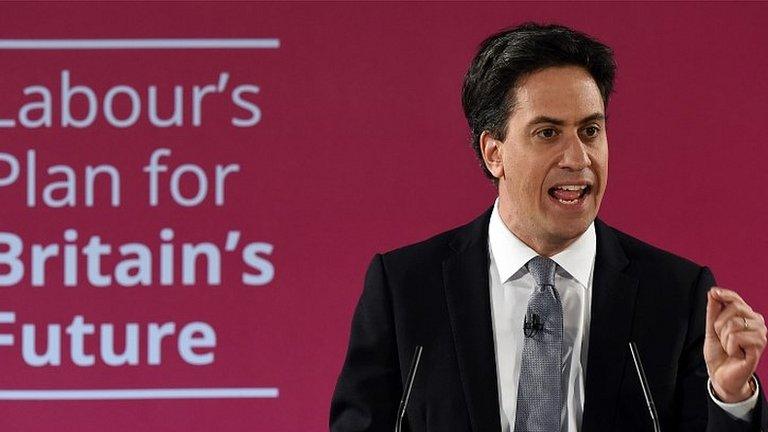Ed Balls: Conservatives planning extreme spending cuts
- Published
Ed Balls: ''The Tories would, in the next five years, need to make spending cuts which add up to a staggering total of £70bn''
Labour has accused the Conservatives of planning "extreme" post-election public spending cuts of £70bn.
Shadow chancellor Ed Balls made a speech unveiling Labour's analysis of how Conservative plans would affect non-protected Whitehall departments.
It comes less than two weeks before Chancellor George Osborne presents his final Budget before the election.
Prime Minister David Cameron said a Labour government would lead to increased debt, borrowing and taxes.
The Conservatives said the Institute for Fiscal Studies had said the Conservative cuts would total £30bn, not £70bn.
The Liberal Democrats said both Labour and the Conservatives were planning to "lurch away from the centre ground".
'Genuine choice'
David Cameron has promised to protect England's NHS budget in real terms and schools' cash budgets.
But Mr Balls claimed to show how non-protected departments, such as policing and social care, would face "catastrophic" cuts if the Conservatives were re-elected in May's general election.
Grant Shapps said the independent Institute for Fiscal Studies put the size of the consolidation planned by the Tories at £30bn
Speaking in central London, he said Conservative plans on tax and spending suggested the smallest police force since the 1970s.
The only alternative, he claimed, was to raise VAT or cut the NHS, which has been ruled out by the Conservatives.
Mr Balls said Mr Osborne had made a "genuine strategic choice" to "dogmatically" increase spending cuts to meet his fiscal targets.

Analysis by Robert Peston, economics editor

In the light of Ed Balls's speech today, which claims that the Tories would cut public spending by a further £70bn if they were to win the general election, I need to slightly amend my judgement that next week's Budget is bound to be the dullest on record.
Because Balls's analysis has nudged me to remember that there is one big policy judgement that George Osborne and David Cameron have to make between now and Budget day on March 18 - which is whether to stick to the plan outlined in December's autumn statement to generate an overall budget surplus of £23.1bn in 2019-20.

BBC assistant political editor Norman Smith said Labour's "dossier" was designed to give people "the political heebie jeebies" given the scale of cuts required, and an attempt to paint the Conservatives as ideological when it comes to reducing spending.
The "big danger" for Labour, he said, was that people start asking about the opposition's own cost-cutting plans, with those announced so far amounting to "small beer compared to the size of the hulking great deficit we face".
Asked after his speech what alternatives his party was proposing, Mr Balls said he had set out "huge amounts of details" about what he said were "sensible" spending cuts Labour would make.
These included stopping the winter fuel allowance increase for the richest pensioners and limiting rises in child benefit. Mr Balls also said Labour's "zero-based review" had identified savings in different government departments including scrapping elected police commissioners and cutting "wasteful expenditure" on the free schools programme.
'Pretty stark'
Conservative ministers presented their own dossier in January showing what they said were unfunded spending commitments made by Labour.
Asked about Mr Balls' speech during a visit to a London school, Mr Cameron said: "What we see from Labour is simply proposals for more borrowing, more taxes, more debt... exactly what got us into this problem in the first place."
The prime minister said he had set out "very clearly" how the savings would be made.
Conservative chairman Grant Shapps said Mr Balls was "making this up on the back of an envelope" and that his speech had made him "a laughing stock".
According to the Institute for Fiscal Studies, external (IFS), the differences between Labour and the Conservatives' deficit reduction strategies are "pretty stark".
The Conservatives are planning an overall budget surplus of £23bn by 2019-20. Labour would deliver a surplus only on the current budget and allow higher spending on investment.
Lib Dem plans
Paul Johnson, of the IFS, told BBC News the overall difference between the two parties' plans was "£25bn or £30bn" and that cuts would be "much more significant" under the Conservatives' plans.
He added: "Of course on the other side of that therefore there would be more debt and more deficit under the Labour Party - not by a massive amount, given the scale of the overall debt, but there is a difference."
The Liberal Democrats are also setting out their economic strategy on Monday, with a target of making the UK the largest economy in Europe by 2035.
The party's economic strategy features a mixture of tax increases and spending cuts.
Party leader Nick Clegg, speaking alongside Business Secretary Vince Cable, said: "Make no mistake, the recovery would not be happening without the Liberal Democrats."
His party would create a "strong, modern and innovative economy", he said, adding that Labour would borrow more and put the recovery at risk, while the Conservatives sensed "an ideological opportunity to shrink the state".
- Published9 March 2015
- Published9 March 2015

- Published5 January 2015
